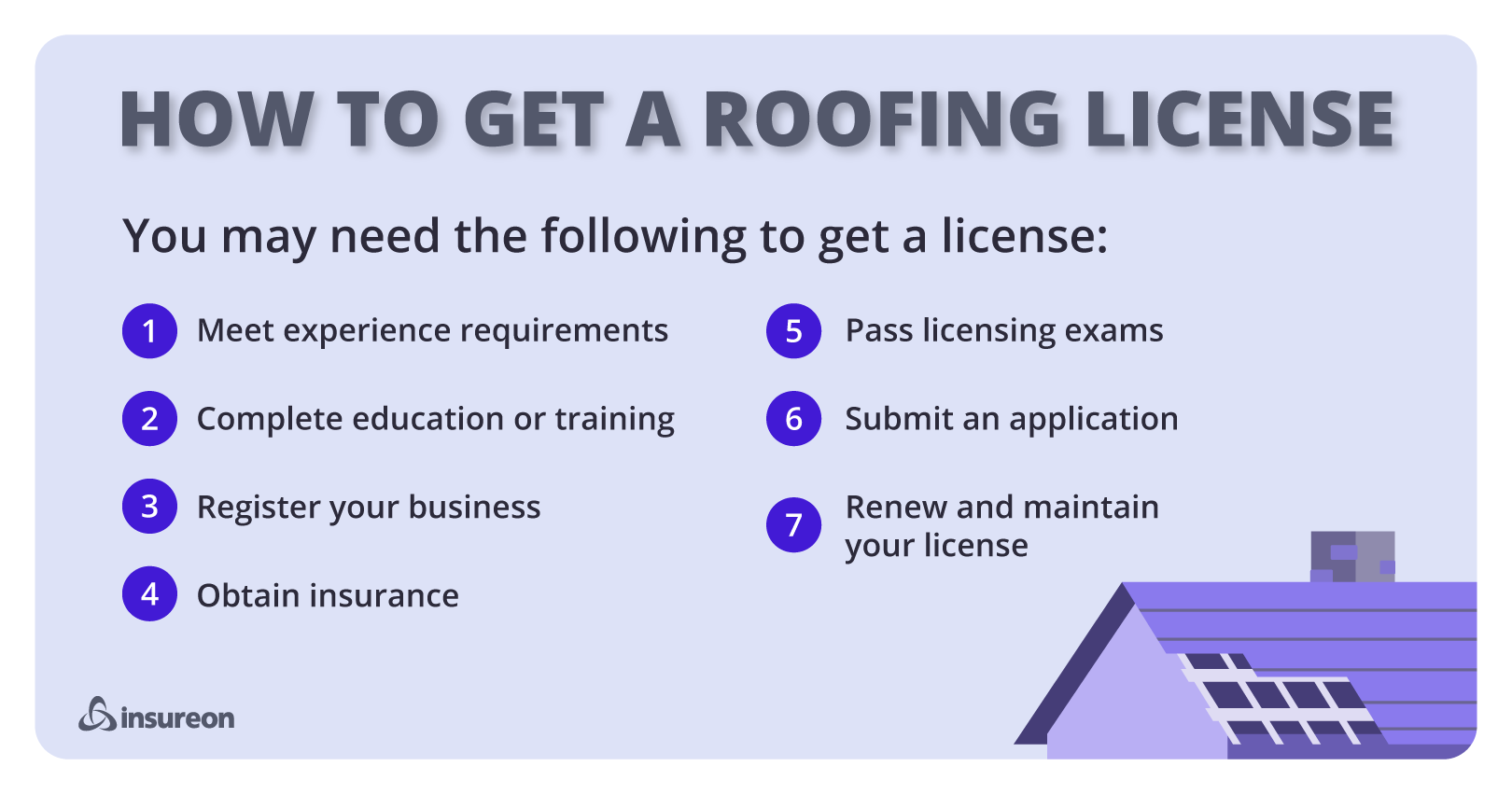Roofing license requirements

The construction of new homes, renovations of existing homes, and, sadly, the effects of natural disasters make roofing an occupation with a lot of demand.
But before you open your small business as a roofer, it’s important to know what requirements you must meet for operating in your locale. This includes insurance, licensing, experience, and education or training.
What insurance coverage do roofing contractors need?
States dictate what type of insurance is needed for roofers. However, there are a few types of policies that are generally seen as standard in this line of work. This includes:
General liability insurance for contractors: General liability should be the first financial shield for every small business. It can save you from a lot of unexpected expenses, and in the roofing industry, those can happen suddenly and add up quickly. For example, if shingles fall during tear off and hit someone or something, general liability insurance would cover costs for third-party injuries or property damage, including litigation.
For extra savings, a general liability policy can be bundled with a commercial property policy. This is known as a business owners’ policy (BOP).
Workers’ compensation insurance: In all states but one, workers’ comp is generally required as soon as you hire your first employee, regardless of industry. However, since roofing is considered a high-risk trade, workers’ compensation coverage is even more important. Workers’ comp would pay for expenses if an employee gets injured on the job. That includes medical bills, lost wages, and death benefits. It typically also includes employer's liability coverage, which would handle any costs related to lawsuits filed by an injured employee.
Sole proprietors with no employees typically don’t need to buy a workers’ comp policy. But it may be smart to get one anyway, because your health insurance would deny any claim that stems from your work.
That means if you’re injured on the job, medical expenses would be your responsibility. However, if you’re self-employed and have workers’ compensation insurance, that would kick in to cover expenses. It’s important to check local regulations, because some states, like California, require sole proprietors that are roofers (and some in other specific occupations) to carry workers’ comp insurance – whether or not they have employees.
Tools and equipment insurance: Roofing contractors use a lot of tools. And, they’re on different jobsites all the time. That’s the kind of scenario tools and equipment insurance is useful for. It protects mobile tools and equipment that are lost, stolen, or damaged. Items that are older than 5 years old and more than $10K aren't protected by tools and equipment insurance. While commercial property insurance covers tools and equipment as well, it only applies to items that are permanently kept at a specific business address.
Commercial auto insurance: If your roofing business owns any vehicles, then you most likely need commercial auto insurance. Only one state is exempt from this law. Your commercial auto liability policy will pay for a third-party’s medical expenses, property damage, and legal expenses related to a car accident you or one of your workers caused using a business-owned vehicle. Additional protections, like comprehensive coverage, uninsured motorist, or physical damage coverage can also be added. States determine policy limits and what coverage you need.

What other types of legal protections do roofing contractors need?
Another kind of financial instrument roofing contractors should know of is a surety bond. These are legally binding contracts that serve as a guarantee that work will be completed and the client will be paid if it’s not. It demonstrates your financial responsibility to the project.
A surety bond has three parties: the principal, who is doing the work; the obligee, or the client or project owner; and the surety, who underwrites the bond. A big difference between insurance and a surety bond is you have to pay the guarantor back for any bond claim that’s paid out.
Surety bonds not only show you’re reliable, but they’re necessary to work with some clients, especially government agencies. Bond requirements vary by state.
There are different types of surety bonds, but the ones most common in the construction industry are:
- License bonds (also known as permit bonds)
- Contract bonds (also known as performance bonds or construction bonds)
- Bid bonds
- Payment bonds
- Maintenance bonds
- Fidelity bonds (also known as employee dishonesty bonds)
Do roofers need to be licensed?
Generally, roofing contractors need a license to operate legally in their state or municipality. Even when a license isn’t required, contractors who hold one generally have a more solid reputation and better chances at getting work, especially with commercial clients and government contracts. That’s why the phrase “licensed and bonded” is held in such high regard.

Roofing license requirements by state
Each state sets up its own qualifying conditions when it comes to licensing roofing contractors. It prescribes what’s needed to obtain one, including insurance, testing, and experience requirements.
In some cases, for licensure purposes, a roofer is classified as a general contractor, or there may be a subset as a specialty contractor or home improvement contractor. The type of work you do may impact your application process as well. Residential contractors can have different requirements for their roofing licenses than those who do commercial work.
Do roofers need a license in California?
Yes, California requires roofers to hold a C-39 Roofing Contractor License from the Contractors State License Board (CSLB). Applicants must:
- Have four years of experience
- Pass two exams
- Secure a contractor’s bond
Do roofers need a license in Florida?
Yes, Florida requires roofers to hold a license issued by the Florida Department of Business and Professional Regulation (DBPR). Applicants must:
- Have four years of experience
- Pass a state exam
- Meet the financial requirement
- Undergo a background check
- Show proof of insurance
Do roofers need a license in Georgia?
No, Georgia doesn’t require roofers to hold a license. However, the Georgia Roofing Contractors Association (GARCA) offers a voluntary licensing program. To qualify, applicants must:
- Show proof of business registration
- Show proof of insurance
- Pass an exam
Do roofers need a license in Louisiana?
Yes, Louisiana requires roofers to hold a license if they’re working on commercial projects with a value of $50,000 or more, including labor and materials. Applicants must:
- Meet the financial requirement
- Pass state exams
Do roofers need a license in Minnesota?
Yes, Minnesota requires contractors who make $15,000 a year or more to be licensed to do roofing work. Applicants must:
- Undergo a background check
- Show proof of insurance
- Pass exams
- Secure a $15,000 surety bond
Do roofers need a license in New York?
No, New York doesn’t license roofers at the state level. However, local governments, including New York City and various counties, may require licensing or registration for roofing contractors.
Do roofers need a license in Texas?
No, Texas doesn’t require roofers to hold a license. However, the Roofing Contractors Association of Texas (RCAT) offers a voluntary licensing program. To qualify, applicants must:
- Show proof of business registration
- Show proof of insurance
- Pass an exam
Which states don’t require a roofing license?
While the following states don’t have statewide licensing requirements for roofing contractors, local municipalities may have their own set standards. It’s advisable to check with authorities where your company operates to ensure compliance with all applicable laws and regulations.

How do you get a roofing license?
If you’re just starting your small business, you may wonder, “Is it hard to get a roofing license?” Thankfully, if you know what you need—and that depends on where you live—the licensing process can be fairly straightforward. Here’s a simple checklist of things you’ll likely run across to qualify for a roofing license:
- Meet experience requirement: Typically 2–4 years of relevant work experience is enough. Coursework may also count toward the time obligation.
- Complete education requirement: Some states stipulate you must go through a certain length of formal education or training.
- Register your business: Choose a business entity and file with the state.
- Obtain insurance: General liability and workers’ compensation insurance are often mandatory.
- Pass licensing exam: Most states require passing a trade and/or law exam.
- Submit license application form: Provide all necessary paperwork and pay relevant application fees.
After you receive your roofing license, it’ll need to be renewed to stay current. Most states’ business licenses are good for 2–4 years, but a few are only valid for one year. In some cases, you’ll need to complete continuing education to qualify for renewal. These credits could include information about industry best practices or building code and safety regulation changes.
Even if your state or municipality doesn’t handle licensure, it may be worthwhile to obtain a voluntary certification, because it builds credibility for your business. A certified contractor demonstrates to potential clients they’re responsible, conscientious, and professional. That could lead to more contracts.
Get roofer’s insurance quotes with Insureon
Start your path towards becoming a roofing contractor today with Insureon. By filling out our brief online application, our expert agents will put together quotes from top-rated U.S. insurance companies. After you compare rates, you can get affordable roofing insurance that meets your needs in less than 24 hours. In addition, you can obtain your certificate of insurance on the same day through our easy-to-use online portal.
Sara Singh, Contributing Writer
Sara’s career has taken her across the writing spectrum. She started as a television news producer, then was hired as the marketing manager for a financial services firm. After working for the publisher of the world’s most widely circulated magazine, Sara went into the agency scene as a copywriter and finally served as the in-house content writer for a tech consultancy. Now, she freelances for a variety of clients so she can have the flexibility to do volunteer work and travel.









